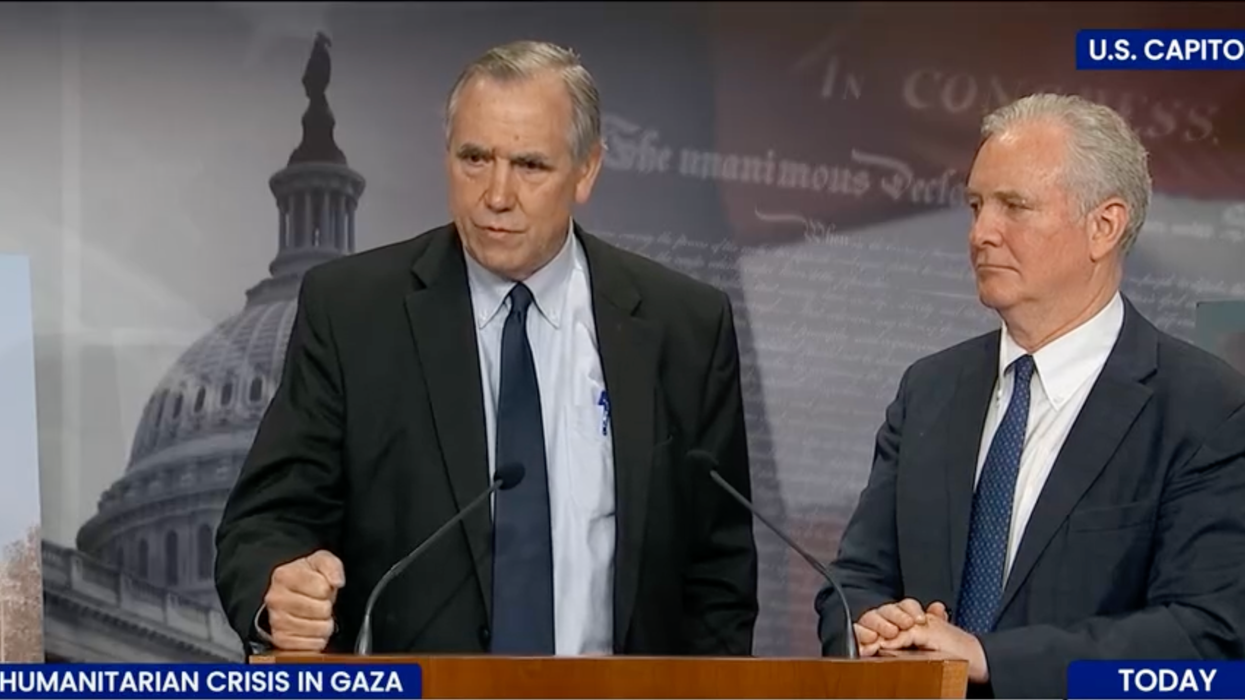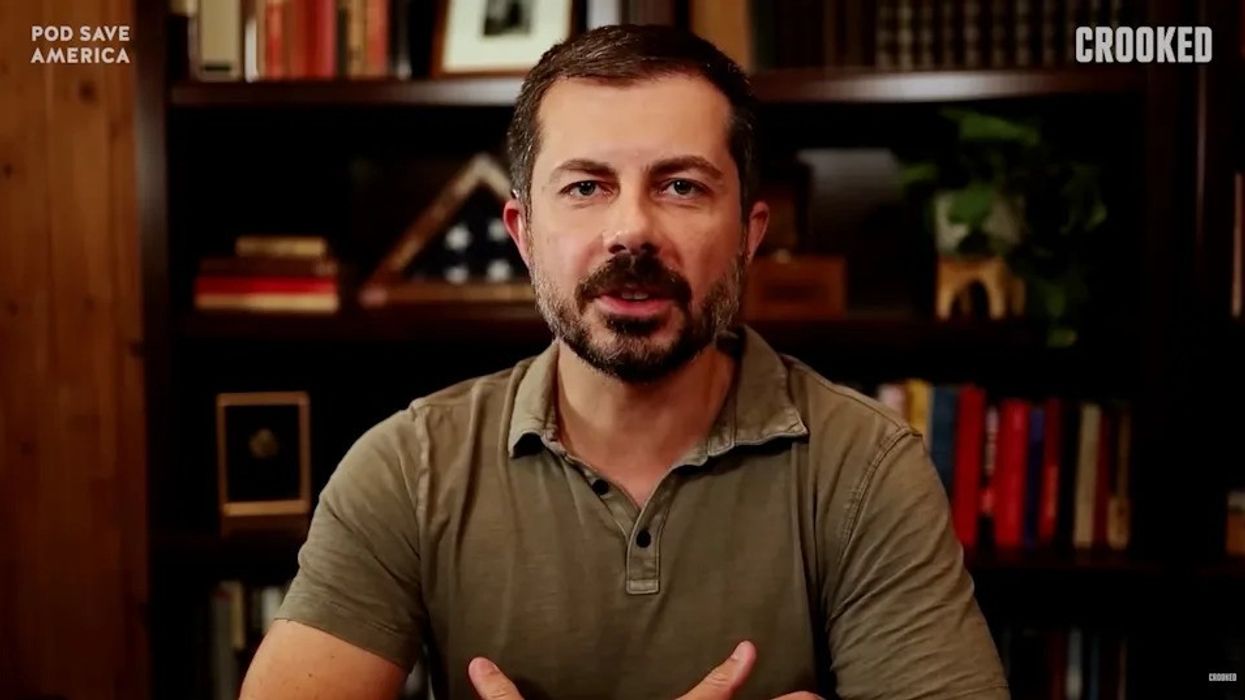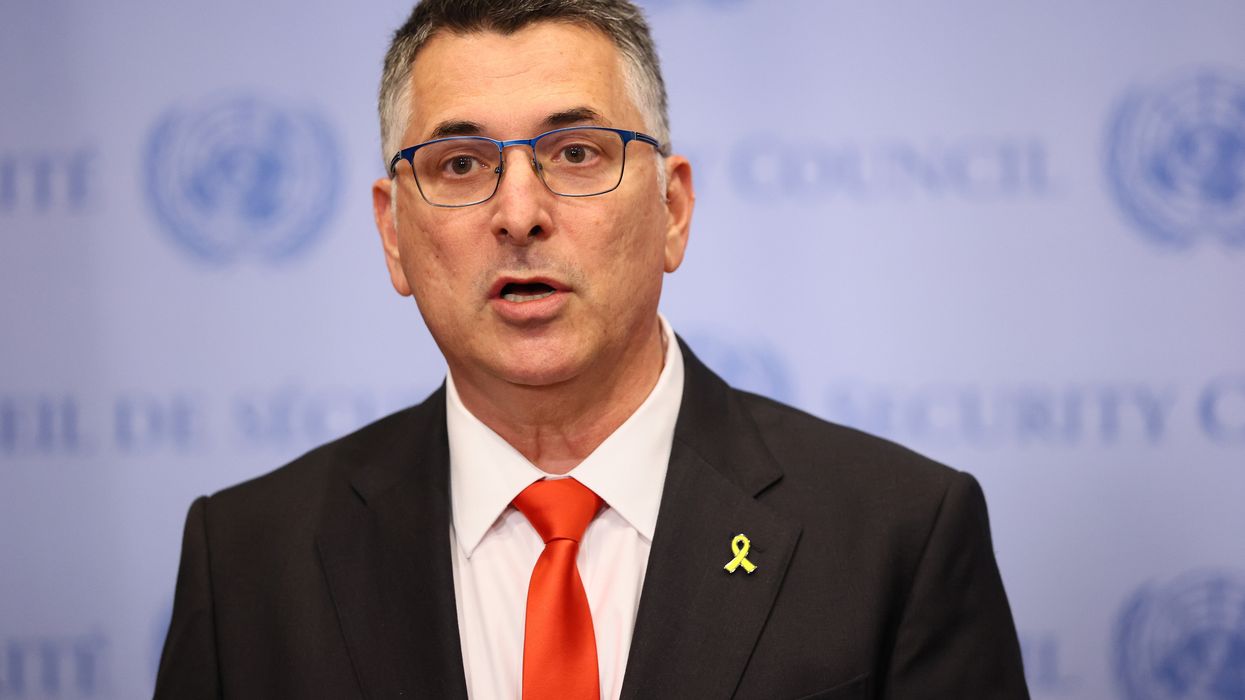Senate Dems, Sanders Call for US Recognition of Palestinian Statehood
"The goal of a Palestinian state can’t be put off any longer if we want the next generation to avoid suffering from the same insecurity and affliction," said Sen. Jeff Merkley.
As some of the United States' closest allies join most of the world's nations in officially recognizing Palestinian statehood amid Israel's worsening genocide and famine in Gaza, US Sen. Jeff Merkley and seven colleagues on Thursday urged President Donald Trump to follow suit.
The senators introduced a nonbinding resolution calling on the president "to recognize a demilitarized state of Palestine, as consistent with international law and the principles of a two-state solution, alongside a secure state of Israel."
The resolution—which is cosponsored by Sens. Chris Van Hollen (D-Md.), Tim Kaine (D-Va.), Bernie Sanders (I-Vt.), Peter Welch (D-Vt.), Tina Smith (D-Minn.), Tammy Baldwin (D-Wis.), and Mazie Hirono (D-Hawaii)—repeatedly mentions Hamas "terrorism" while ignoring the alleged crimes against humanity and war crimes for which fugitive Israeli Prime Minister Benjamin Netanyahu and former Defense Minister Yoav Gallant are wanted by the International Criminal Court.
The resolution's demands are "first, an immediate ceasefire, return of all hostages, and influx of aid. But then, a foundation for peace and prosperity for the future—and the only viable path for that is two states for two peoples," said Merkley, who was the first senator to back a Gaza ceasefire.
"The goal of a Palestinian state can’t be put off any longer if we want the next generation to avoid suffering from the same insecurity and affliction," Merkley added.
I’m leading the first-ever Senate resolution in support of Palestinian statehood. There is only one pathway that builds security, peace, and prosperity for Israelis and Palestinians. That path is two states for two peoples.
[image or embed]
— Senator Jeff Merkley (@merkley.senate.gov) September 18, 2025 at 3:48 PM
Van Hollen—who has been one of the Senate's strongest critics of US complicity in Israel's obliteration of Gaza and even tried to visit the strip with Merkley last month—said, "The most viable way to create some light at the end of the very dark tunnel in the Middle East, and assure security and self-determination for Israelis and Palestinians alike, is a two-state solution."
"Given that the Netanyahu government has obstructed that goal and the Trump administration has abandoned it, the Congress must make its position clear," he added.
Kaine said: "The US supported a historic United Nations resolution in 1947 to establish two states—Israel and Palestine. After nearly 80 years, the world has only kept one of those two promises and the lack of progress toward Palestinian autonomy has been a source of continuing tension in the region."
"Since July 2024 when the Israeli Knesset voted to deny a path to Palestinian statehood and made clear that Israel would not accept Palestinian autonomy, I have believed the US should no longer condition recognition on Israeli assent but rather on Palestinian willingness to live in peace with its neighbors," he added.
Approximately 150 of the UN’s 193 member states have officially recognized Palestine. Since October 2023, countries including Australia, Belgium, Canada, France, Malta, Portugal, Slovenia, the United Kingdom, Ireland, Norway, and Spain have either recognized Palestine or announced their intent to do so.
Netanyahu and other Israeli leaders have openly boasted about thwarting Palestinian statehood. The prime minister has made clear his intention for Israel to control "from the river to the sea"—meaning all of Palestine—as envisioned in the founding platform of his Likud party.
Last month, Israeli Finance Minister Bezalel Smotrich—who, like many of his far-right compatriots, denies the very existence of the Palestinian people—proposed another expansion of Israel's illegal settler colonization of the occupied West Bank, asserting that the construction of thousands of new apartheid homes "buries the idea of a Palestinian state."
Netanyahu signed the proposal last week, declaring that "there will be no Palestinian state"—a position shared by all 15 Likud ministers, who want the prime minister to annex the entire West Bank by year's end.
Smotrich is also among the Israeli officials who favor annexing Gaza, ethnically cleansing its Palestinian population, and opening the strip for Israeli colonization. Trump, meanwhile, has proposed US control of Gaza and transformation of its Mediterranean coast into the "Riviera of the Middle East."
Lawmakers in Israel's Knesset, or Parliament, have also worked to block progress toward a two-state solution. In July, they hosted a conference titled "The Gaza Riviera–From Vision to Reality" advocating the conquest of Gaza and ethnic cleansing of Palestinians in order to make the strip what Smotrich called "an inseparable part of Israel."
Critics allege that the ultimate goal of some Israeli leaders is the realization of a so-called "Greater Israel" stretching from the Nile River in Egypt to the Euphrates in Iraq.
The senators' resolution comes as more and more congressional Democrats accuse Israel of genocide, and reflects the wishes of a majority of Americans, according to recent polling.
On Wednesday, Sanders became the first upper chamber lawmaker to say that Israel is committing genocide in Gaza following the publication of a United Nations commission report that reached the same conclusion. Israel is currently facing a genocide case at the International Court of Justice launched by South Africa and backed by around two dozen countries.
However, on the whole, the US government—which provides Israel with tens of billions of dollars in armed aid and diplomatic support—continues to back Israel. On Thursday, the US for the sixth time vetoed a United Nations Security Council resolution calling for an immediate Gaza ceasefire and release of all hostages held by Hamas.
This, as Israeli forces intensified their bombardment and ground invasion of Gaza City during Operation Gideon's Chariots 2, a campaign of conquest, occupation, and ethnic cleansing that aims to leave Israel fully in control of the strip.
Israeli forces killed dozens more Palestinians on Friday, the 714th day of a genocide that's left more than 240,000 Gazans dead, maimed, or missing and hundreds of thousands more starving, with no end in sight.


